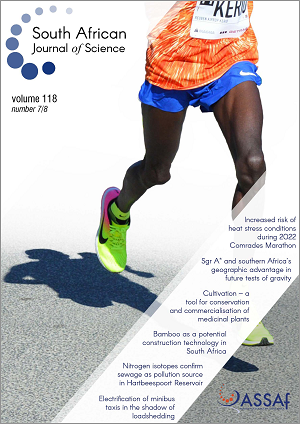Monilinia fructicola intercepted on Prunus spp. imported from Spain into South Africa between 2010 and 2020
DOI:
https://doi.org/10.17159/sajs.2022/12499Keywords:
interception, Prunus spp., stone fruits, pathogen, quarantine pestAbstract
The international trade of plants and their products, such as fresh fruits, can facilitate the introduction and spread of foreign pests and diseases. We examined South Africa’s import of stone fruits (Prunus spp.) as a pathway for introducing Monilinia fructicola (G. Wint.) Honey and document recommended phytosanitary measures to deal with the risk associated with its exportation into the country. Fresh fruits of Prunus spp. are imported from various countries. The current study provides a report on 10 years (2010–2020) importation of Prunus spp. from Spain to South Africa with associated cases of M. fructicola. We also detail the current management measures for imported stone fruits from Spain to South Africa. We report 18 M. fructicola detections that were found during the study period. The number of detections presents enough trends to determine the level of phytosanitary concerns regarding the importation of Prunus spp. fresh fruit from Spain, which cannot be neglected. M. fructicola is an economically important brown rot on many fruit hosts and potentially threatens agricultural and horticultural industries, the environment, and biodiversity in South Africa. The importation of Prunus spp. requires intensive management strategies for M. fructicola, as pathogens may pose a major phytosanitary concern because it could thrive and reproduce in various environmental conditions and on various host plants in South Africa. Therefore, if M. fructicola establishes in South Africa, its impacts will have consequences for different key socioeconomic sectors, including the agricultural industry.
Significance:
- Monilinia fructicola is a pest of quarantine significance for South Africa.
- If not managed properly, the importation of Prunus with associated M. fructicola will be a significant phytosanitary concern that could cause severe economic impacts on the South African agricultural industry.
Published
Issue
Section
License

All articles are published under a Creative Commons Attribution 4.0 International Licence
Copyright is retained by the authors. Readers are welcome to reproduce, share and adapt the content without permission provided the source is attributed.
Disclaimer: The publisher and editors accept no responsibility for statements made by the authors
How to Cite
- Abstract 426
- PDF 572
- EPUB 186
- XML 175












.png)